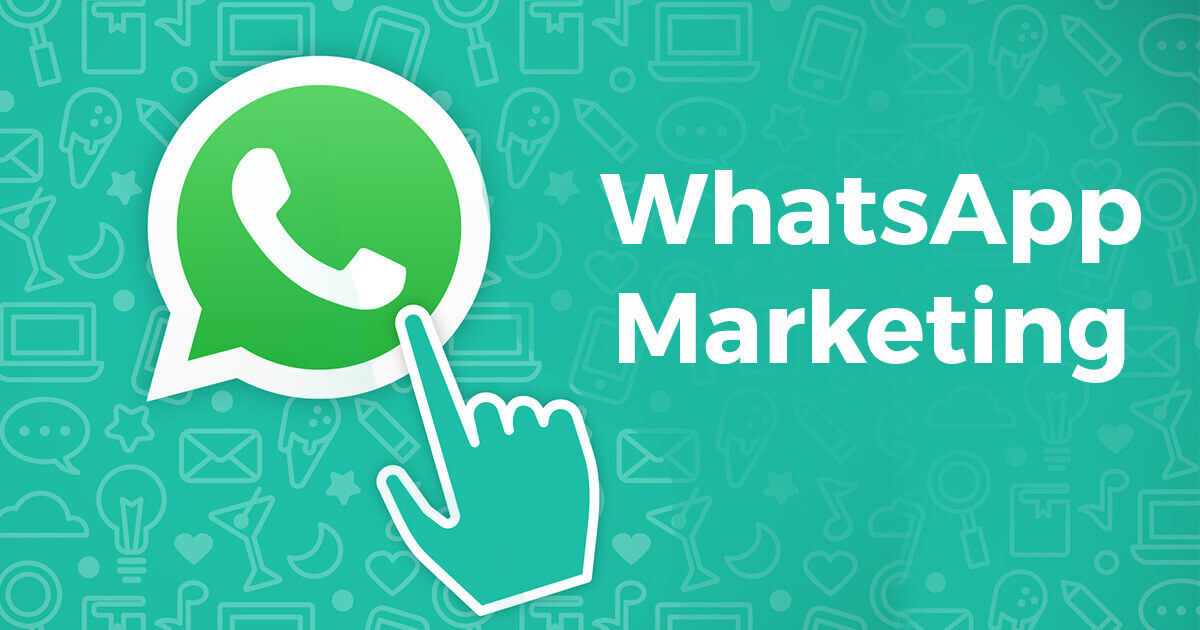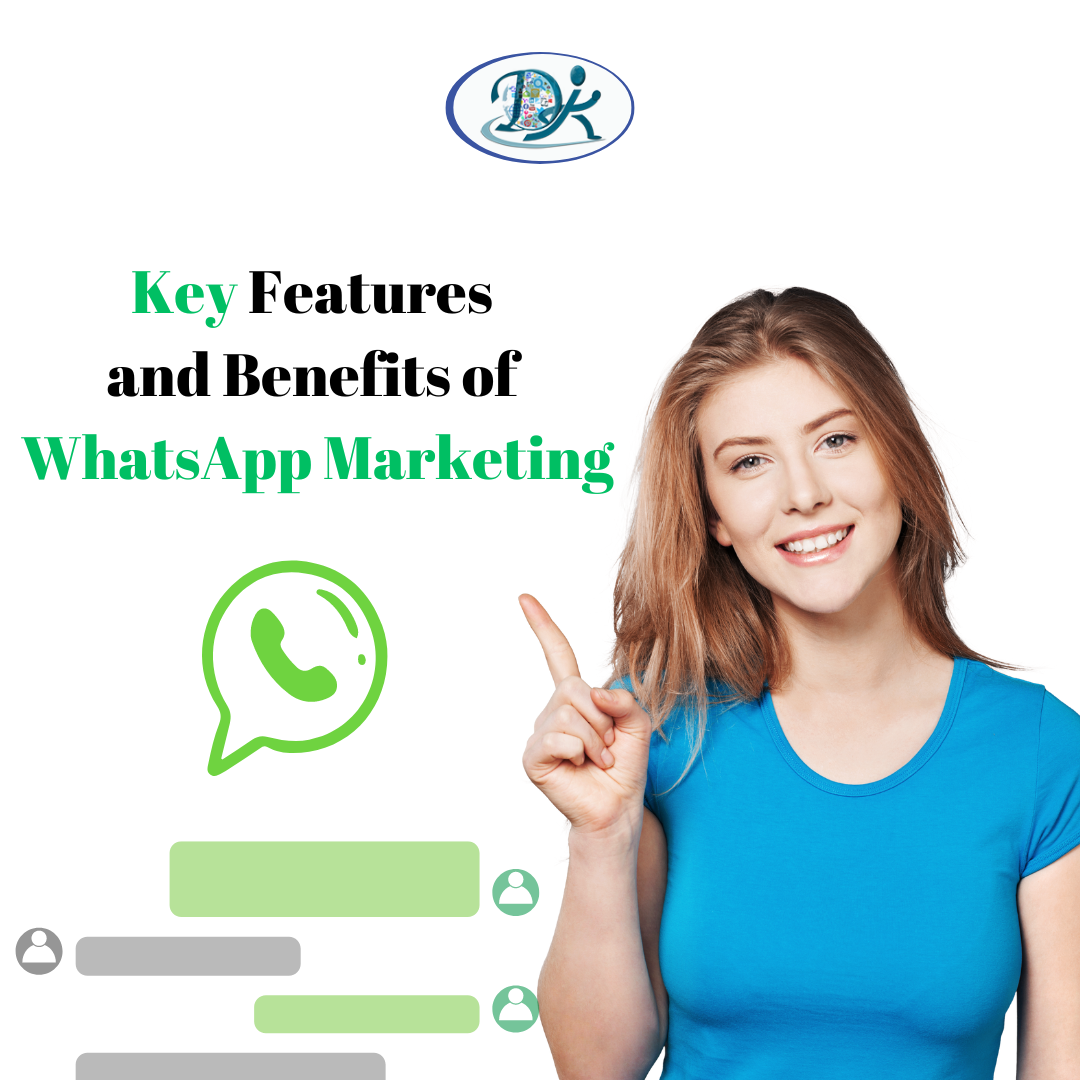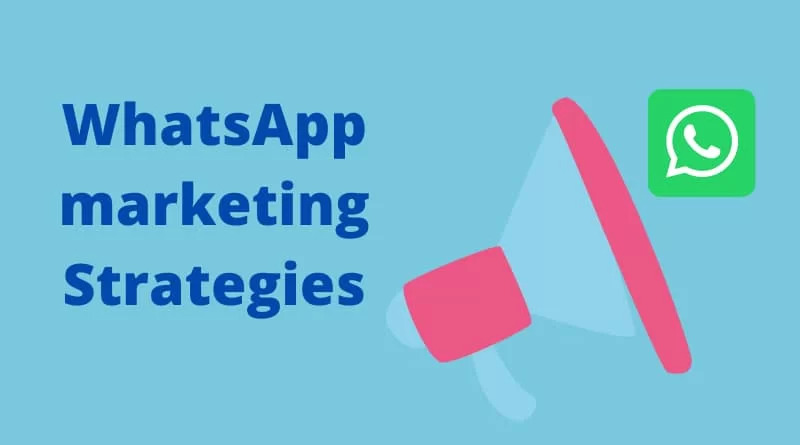Why you should start a WhatsApp Marketing in 2024
WhatsApp Marketing refers to the practice of using the WhatsApp messaging platform as a tool for promoting products or services, as well as for engaging with customers and prospects. It involves businesses reaching out to their target audience through WhatsApp's messaging features to share updates, offers, and other relevant information.
WhatsApp, with over 2 billion users worldwide, has become an indispensable tool for communication. However, its potential as a marketing platform often remains untapped. In this guide, we'll delve into the world of WhatsApp Marketing, exploring strategies, best practices, and innovative techniques to leverage this powerful platform for business growth.

What is WhatsApp Marketing?
WhatsApp Marketing is a strategy that businesses use to leverage the WhatsApp messaging platform for promotional purposes and customer communication. It involves reaching out to existing and potential customers through the app's messaging features to share updates, offers, and information about products or services. Essentially, it's about establishing a direct line of communication between businesses and their target audience, allowing for personalized interaction and engagement.
Why Choose WhatsApp for Marketing?
There are several compelling reasons why businesses choose WhatsApp for their marketing efforts. Firstly, WhatsApp boasts an enormous user base, with billions of active users worldwide. This widespread adoption ensures that businesses can potentially reach a vast audience with their marketing messages. Additionally, WhatsApp is a familiar and widely-used platform for communication, making it convenient for both businesses and customers. Since many people already use WhatsApp for chatting with friends and family, they are more likely to engage with business messages on the platform.
WhatsApp offers features that make it particularly suitable for marketing purposes. These features include the ability to send multimedia content such as images, videos, and documents, enabling businesses to create visually appealing and engaging marketing materials. Group chats allow businesses to communicate with multiple customers simultaneously, facilitating group announcements, discussions, and customer support. WhatsApp provides dedicated tools for businesses, such as automated messages, quick replies, and business profiles, streamlining the process of managing customer interactions and marketing campaigns.
Key Features and Benefits of WhatsApp Marketing

- Direct Communication: WhatsApp enables businesses to send messages directly to their customers' smartphones, ensuring that marketing communications are delivered promptly and efficiently. This direct line of communication fosters a sense of closeness and immediacy, enhancing the overall customer experience.
- Multimedia Support: Unlike traditional text-based messaging platforms, WhatsApp supports various multimedia formats, including images, videos, and documents. This multimedia capability allows businesses to create more visually appealing and engaging marketing content that captures the attention of their audience.
- Group Chats: WhatsApp's group chat feature enables businesses to create groups comprising multiple customers, stakeholders, or team members. This functionality is particularly useful for disseminating information to a specific audience segment, organizing events, or facilitating group discussions.
- WhatsApp Business Tools: WhatsApp provides a range of specialized tools and features designed to meet the needs of businesses. These include automated messages, which can be used to send predefined responses to frequently asked questions or inquiries, and quick replies, which enable businesses to respond rapidly to customer queries.
- Cost-Effective: Unlike traditional forms of advertising such as television commercials or print ads, WhatsApp is a cost-effective marketing channel. Businesses can use WhatsApp to engage with their customers without incurring significant expenses, making it an attractive option for businesses of all sizes.
- High Engagement: WhatsApp boasts high engagement rates, with messages typically being read and responded to more promptly than emails or other forms of communication. This high level of engagement ensures that marketing messages are more likely to reach their intended recipients and generate a response.
WhatsApp Marketing offers businesses a powerful platform for connecting with customers, promoting products or services, and building relationships. By leveraging WhatsApp's extensive reach, user-friendly interface, and array of features, businesses can create compelling marketing campaigns that resonate with their target audience and drive results.
Building Your WhatsApp Marketing Strategy

Building a WhatsApp Marketing Strategy involves a few important steps:
- Defining Your Objectives: Decide what you want to achieve with your WhatsApp marketing. It could be selling more products, providing better customer support, or increasing brand awareness.
- Identifying Your Target Audience: Figure out who you want to reach with your messages. Are they young people, busy moms, or tech-savvy professionals? Knowing your audience helps you create messages that will resonate with them.
- Creating Compelling Content: Make sure your messages are interesting and valuable to your audience. Share updates, offers, or tips that they'll find useful. Use pictures, videos, or emojis to make your messages more engaging.
- Crafting a Consistent Brand Voice: Keep your messages sounding like your brand. Whether you're funny, serious, or friendly, make sure your tone stays consistent across all your messages.
- Establishing Metrics for Success: Decide how you'll measure if your WhatsApp marketing is working. It could be how many people open your messages, how many click on your links, or how many make a purchase because of your messages. Tracking these metrics helps you know what's working and what's not.
Growing Your WhatsApp Audience
Expanding your WhatsApp audience involves several key strategies:
- Promoting Your WhatsApp Presence: Spread the word about your WhatsApp account wherever you interact with customers. This could be on your website, social media profiles, email signatures, or even in your physical store if you have one. Let people know they can connect with you on WhatsApp for updates and offers.
- Encouraging Opt-ins and Subscriptions: Make it easy for people to join your WhatsApp audience by providing clear instructions on how to opt-in. For example, you can include a "Join our WhatsApp list" button on your website or ask customers to text a specific number to subscribe. Offer incentives like exclusive discounts or content to encourage sign-ups.
- Leveraging WhatsApp Business Tools: Take advantage of the features designed specifically for businesses on WhatsApp. These include tools for automating messages, organizing contacts, and providing quick replies. Using these tools can save you time and make it easier to manage your WhatsApp marketing efforts efficiently.
- Integrating WhatsApp into Your Marketing Channels: Incorporate WhatsApp into your overall marketing strategy by cross-promoting it with your other channels. For example, include links to your WhatsApp account in your email newsletters, social media posts, and advertisements. This helps increase visibility and encourages more people to connect with you on WhatsApp.
By implementing these tactics, you can effectively grow your WhatsApp audience and create a larger, more engaged community around your business.
Engaging Your Audience on WhatsApp
Engaging Your Audience on WhatsApp is essential for fostering strong connections and keeping them interested in your business. Here are some effective strategies to achieve that:
- Personalized Messaging: When you send messages to your audience, make them feel special by addressing them by their name or referencing their past interactions with your business. create your content to their interests and preferences to make it more relevant and engaging.
- Sending Timely and Relevant Updates: Keep your audience informed about new products, services, or promotions, but ensure that the information you share is timely and directly related to their needs. Sending irrelevant or outdated updates can lead to disengagement.
- Utilizing Multimedia Content (Images, Videos, GIFs): Incorporating visuals like images, videos, or GIFs into your messages can capture your audience's attention and make your content more visually appealing. Visuals are often more memorable than plain text and can convey messages more effectively.
- Interactive Features (Polls, Surveys, Quizzes): Encourage engagement and interaction by including interactive elements such as polls, surveys, or quizzes in your messages. This not only makes the conversation more dynamic but also allows you to gather valuable feedback and insights from your audience.
- Providing Exceptional Customer Support: Use WhatsApp as a platform to offer prompt and helpful customer support. Respond to inquiries, address concerns, and resolve issues in a timely manner. Providing exceptional customer service on WhatsApp can enhance your brand reputation and build trust with your audience.
Engaging your audience on WhatsApp requires personalized messaging, timely updates, multimedia content, interactive features, and exceptional customer support. By implementing these strategies effectively, you can create meaningful interactions with your audience and strengthen your relationship with them.
Compliance and Privacy Considerations
In the realm of WhatsApp Marketing, it's crucial to adhere to certain rules and regulations while analyzing and refining your strategies. Here's what you need to know:
- Understanding WhatsApp's Terms of Service: Before diving into marketing on WhatsApp, familiarize yourself with the platform's Terms of Service. These guidelines outline what is and isn't allowed when using WhatsApp for business purposes. Make sure your marketing activities comply with these terms to avoid any potential violations.
- Respecting Users' Privacy Rights: Respect the privacy of your users by only collecting and using their personal information for legitimate purposes. Avoid sharing their data with third parties without their consent, and be transparent about how you handle their information. Respecting users' privacy builds trust and credibility, which are essential for successful marketing efforts.
- Implementing GDPR and Data Protection Policies: If you operate in regions covered by the General Data Protection Regulation (GDPR) or similar data protection laws, ensure that your WhatsApp marketing practices align with these regulations. This includes obtaining consent from users before collecting their personal data, providing options for data access and deletion, and implementing robust security measures to protect user information.
- Ensuring Consent and Opt-out Mechanisms: Obtain consent from users before adding them to your WhatsApp marketing list. Clearly communicate what type of messages they will receive and how often. Additionally, provide easy opt-out mechanisms, such as a simple reply with "STOP," to allow users to unsubscribe from your messages if they wish. Respecting users' preferences enhances their experience and reduces the likelihood of complaints or legal issues.
Analysing and Optimizing Your WhatsApp Marketing Efforts
Analyzing and optimizing your WhatsApp marketing efforts is crucial for ensuring effectiveness and driving better results. Here's how you can do it:
- Tracking Key Performance Indicators (KPIs): Identify and track the key metrics that align with your marketing goals. These may include metrics like the number of messages sent, open rates, click-through rates, conversion rates, and customer acquisition costs. Tracking KPIs helps you gauge the success of your campaigns and identify areas for improvement.
- Analyzing User Engagement and Response Rates: Dive deeper into user engagement data to understand how your audience is interacting with your messages. Analyze metrics such as the time of day when users are most active, which types of content receive the highest engagement, and the frequency of responses. This analysis can help you tailor your messaging strategy to better resonate with your audience.
- A/B Testing Messages and Content: Experiment with different message formats, content types, and calls to action using A/B testing. Divide your audience into segments and send them different variations of your messages to see which performs better. Test variables such as message timing, language, visuals, and offers to identify what resonates most with your audience.
- Iterating and Refining Your Strategy Based on Insights: Use the insights gathered from tracking KPIs, analyzing user engagement, and A/B testing to refine your WhatsApp marketing strategy. Iterate on your messaging approach, content strategy, and targeting tactics based on what you learn from the data. Continuously testing and optimizing your campaigns ensures that you're always improving and maximizing your marketing efforts.
By consistently analyzing and optimizing your WhatsApp marketing efforts, you can better understand your audience, improve engagement, and drive meaningful results for your business. This iterative approach allows you to adapt to changing market dynamics and stay ahead of the competition.
Case Studies Example of successful WhatsApp Marketing
We'll explore real-life examples of successful WhatsApp marketing campaigns, glean insights from businesses that have mastered WhatsApp marketing, and extract valuable lessons and takeaways for your own strategy.
- Real-life Examples of Effective WhatsApp Marketing Campaigns
- Example 1: XYZ Clothing Brand used WhatsApp to send personalized style recommendations to customers based on their preferences and purchase history. This resulted in a significant increase in sales and customer satisfaction.
- Example 2: ABC Restaurant utilized WhatsApp to offer exclusive deals and promotions to loyal customers. By sending timely and enticing offers, they saw a boost in foot traffic and revenue.
- Insights from Businesses That Have Mastered WhatsApp Marketing
- Business X found success by maintaining a conversational tone in their WhatsApp messages, which resonated well with their audience and fostered a sense of connection.
- Business Y leveraged WhatsApp's multimedia capabilities to share behind-the-scenes content, such as product demonstrations and employee spotlights, which helped humanize their brand and build trust with customers.
- Lessons Learned and Takeaways for Your Own Strategy
- Personalization is key: Tailor your messages to individual preferences and behaviors to create a more engaging and relevant experience for your audience.
- Be creative with content: Experiment with different types of content, such as images, videos, and GIFs, to capture attention and convey your brand's personality.
- Focus on value: Provide valuable information, offers, or entertainment to your audience to keep them interested and engaged.
- Measure and iterate: Continuously track your campaign performance, gather feedback, and make adjustments based on insights to optimize your WhatsApp marketing strategy over time.
By studying these case studies and success stories, you can gain inspiration and valuable insights to enhance your own WhatsApp marketing efforts and achieve greater success in connecting with your audience and driving business results.
Future Trends and Innovations in WhatsApp Marketing
Looking ahead, several exciting developments are shaping the future of WhatsApp marketing:
- Emerging Technologies (AI, Chatbots, Automation):
AI-powered chatbots are becoming increasingly sophisticated, enabling businesses to automate customer interactions on WhatsApp. These chatbots can handle queries, provide personalized recommendations, and even facilitate transactions, enhancing efficiency and improving user experience. -
Integration with E-commerce Platforms:
WhatsApp is expected to further integrate with e-commerce platforms, allowing businesses to seamlessly sell products and services directly through the app. This integration will enable features such as product catalogs, secure payments, and order tracking, transforming WhatsApp into a powerful sales channel for businesses. - Cross-platform Messaging Integration (WhatsApp, Instagram, Facebook):
With Facebook's integration of messaging across its platforms, including WhatsApp, Instagram, and Facebook Messenger, businesses will have the opportunity to reach a broader audience and engage with customers seamlessly across multiple platforms. This integration will enable unified messaging strategies and enhanced targeting capabilities. - Predictions for the Future of WhatsApp as a Marketing Channel:
WhatsApp is poised to become an indispensable tool for businesses, offering unparalleled reach and engagement opportunities. As the platform continues to evolve, we can expect to see enhanced features for businesses, such as advanced analytics, deeper integration with Facebook's advertising tools, and expanded messaging capabilities.
The future of WhatsApp marketing holds exciting possibilities, driven by emerging technologies, deeper integration with e-commerce platforms, cross-platform messaging integration, and continued innovation within the WhatsApp ecosystem. Businesses that embrace these trends and adapt their strategies accordingly will be well-positioned to capitalize on the opportunities offered by WhatsApp as a marketing channel.
Digital Karobari offers the best WhatsApp marketing services in Mumbai. With our expertise and dedication, we help businesses connect with their target audience effectively through WhatsApp. Digital Karobari understands the importance of personalized messaging, timely updates, and engaging content to drive results. We use innovative strategies and tools to maximize the impact of WhatsApp marketing campaigns, helping businesses in Mumbai reach new heights of success. With Digital Karobari, businesses can trust that our WhatsApp marketing efforts are in capable hands, ensuring optimal engagement and growth in the competitive Mumbai market.
